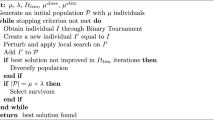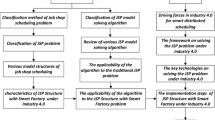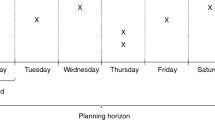Abstract
In the one-machine scheduling problems analysed in this paper, the processing time of a job depends on the time at which the job is started. More precisely, the horizon is divided into time windows and with each one a coefficient is associated that is used to determine the actual processing time of a job starting in it. Two models are introduced, and one of them has direct connections with models considered in previous papers on scheduling problems with time-dependent processing times. Various computational complexity results are presented for the makespan criterion, which show that the problem is NP-hard, even with two time windows. Solving procedures are also proposed for some special cases.


Similar content being viewed by others
References
Gawiejnowicz S (1996). A brief survey of continuous models of scheduling. Found Comput Decis Sci 21: 81–100.
Alidaee B and Womer NK (1999). Scheduling with time dependent processing times: review and extensions. J Opl Res Soc 50: 711–720.
Cheng TCE, Ding Q and Lin BMT (2004). A concise survey of scheduling with time-dependent processing times. Eur J Opl Res 152: 1–13.
Tanaev VS, Gordon VS and Shafransky YM (1980). Scheduling Theory Single Stage Systems. Nauka: Moscow (English translation 1994, Kluwer Academic Publisher: Dordrecht).
Gupta JND and Gupta SK (1988). Single facility scheduling with nonlinear processing times. Comput Ind Eng 14: 387–393.
Browne S and Yechiali U (1990). Scheduling deteriorating jobs on a single processor. Opns Res 38: 495–498.
Gawiejnowicz S and Pankowska L (1995). Scheduling jobs with varying processing times. Inform Process Lett 54: 175–178.
Sundararaghavan PS and Kunnathur AS (1994). Single machine scheduling with start time dependent processing times: some solvable cases. Eur J Opl Res 78: 394–403.
Mosheiov G (1995). Scheduling jobs with step-deterioration; minimizing makespan on a single and multi-machine. Comput Ind Eng 28: 869–879.
Kononov AV (1997). On scheduling of a single machine jobs with processing times nonlinear in time. In: Korshunov AD (ed). Operations Research and Discrete Analysis. Kluwer Academic Publisher, New-York, pp 109–122.
Cai J-Y, Cai P and Zhu Y (1998). On a scheduling problem of time deteriorating jobs. J Complexity 14: 190–209.
Kubiak W and Van de Velde S (1998). Scheduling deteriorating jobs to minimize makespan. Naval Res Logist 45: 511–523.
Garey MR and Johnson DS (1979). Computers and Intractability; a Guide to the Theory of NP-Completeness. Freeman: San Francisco.
Martello S and Toth P (1990). Knapsack Problems: Algorithms and Computer Implementations. Wiley: Chichester.
Author information
Authors and Affiliations
Corresponding author
Additional information
3This research was conducted while this author was at the Ecole des Mines de Nantes.
Rights and permissions
About this article
Cite this article
Lahlou, C., Dauzère-Pérès, S. Single-machine scheduling with time window-dependent processing times. J Oper Res Soc 57, 133–139 (2006). https://doi.org/10.1057/palgrave.jors.2601931
Received:
Accepted:
Published:
Issue Date:
DOI: https://doi.org/10.1057/palgrave.jors.2601931




